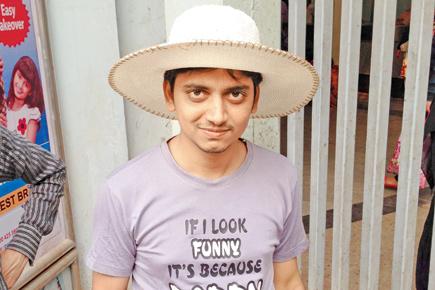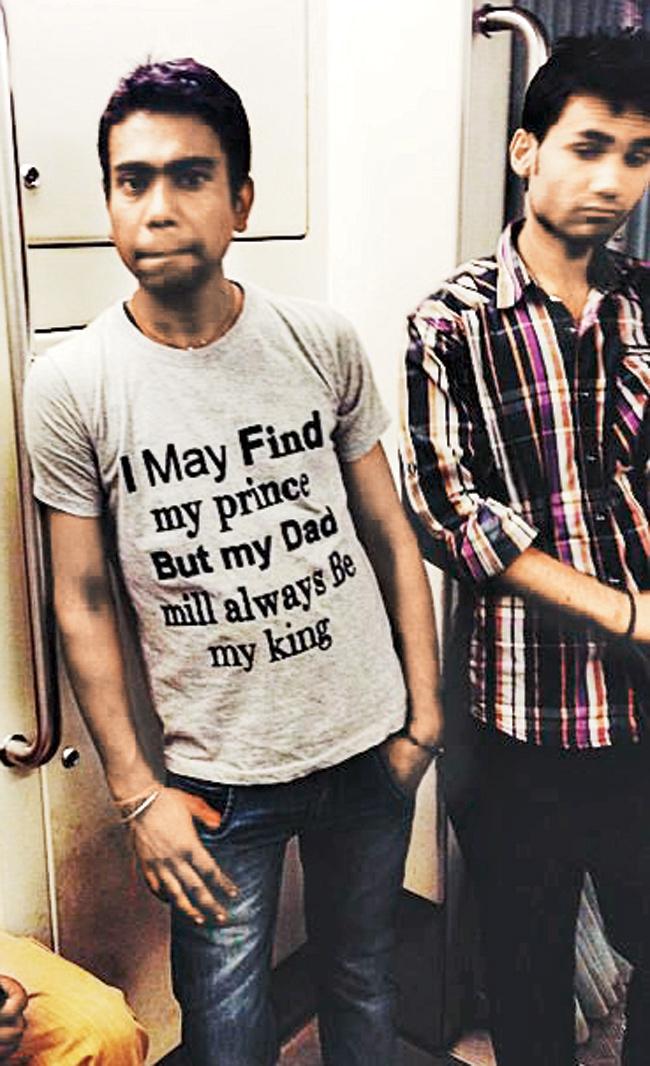Hindi-Urdu translator Grant Davis ambles along Delhi’s streets and archives people wearing quirky T-shirts on his blog, Nice Shirt Dear. He tells Kareena Gianani that he loves the street philosophy he unearths in the unlikeliest of places while at it

Grant Davis
It may have happened to you. May be more than once. You pass by a man or woman wearing a message T-shirt which is cheeky, corny or unintelligible, perhaps one which even reads ‘Fasting And Not Furious’ or ‘I May Find My Prince But My Dad Will Always Be My King’. You roll your eyes or chuckle and swear that you wouldn’t be caught dead in it.
ADVERTISEMENT

Grant Davis’ photographs of men wearing message T-shirts
Delhi-based Hindi-Urdu translator, Grant Davis, however, often does a double take. Then, takes his iPhone out and requests the wearer (mostly men in his case) to pose for a photograph. In fact, he often spends some evening huntings similar subjects down near Jama Masjid in Old Delhi.

You never know where one funny T-shirt can take you, after all — Delhi-based filmmaker, Grant Davis
Davis, 27, then uploads the photographs on his website as part of his pet project, Nice Shirt Dear. Call it an Indian street fashion archive, or an attempt to understand street philosophy, as Davis likes to puts it, Nice Shirt Dear is one quirky repository of all things extraordinary you might find on that regular passer-by on the streets of the country.

Street style
In January this year, Davis co-founded his creative research agency, Dear, and has been actively involved in content creation and documentaries on India. He takes it all back to his fascination for Bollywood as he grew up in New York. “I later met a friend who was pursuing his masters in Urdu literature. That’s the first time I felt I could actually make a living out of what enamours me most, and I studied Hindi and Urdu at the American Studies Centre for Urdu, which required me to take trips to Lucknow, too. After my studies, the way ahead was clear — come to India and get involved with the country’s cultures and stories and have a creative career out of it,” says Davis over the telephone from Delhi.
In Delhi’s lanes
Davis’ work often involves pounding the pavement for reference photographs of signage and typography, and looking for other design elements for projects. Soon, he began noticing the sheer number of men wearing T-shirts with sometimes-hilarious-sometimes-philosophical messages on them. “These message T-shirts are ubiquitous and make such a strong fashion statement, but they have never been archived or discussed on large platforms,” he says. Davis has clicked photographs on the streets of Delhi, Chennai, Gujarat, Uttar Pradesh and Mumbai.
The name of the archive and his company came from the fixation Davis noticed many of his Indian friends have with the word, ‘dear’. “I’ve had countless Facebook conversations and friend requests where people say, ‘Hi, dear’, ‘How are you doing, dear’, which, I admit, never fails to make me smile. The name is just a commentary on the way we speak here,” says Davis.
All the good men
When it comes to conversations with his subjects, Davis says he meets both the laconic and garrulous. “For a lot of guys I meet, the T-shirts don’t mean anything — they wear it for purely utilitarian reasons and don’t even know what the message means. A few wear it because they think it is cool and sums up the motto of their life in a way.
What fascinates me the most about this exercise is how varied reactions can be to one simple T-shirt. Some of my subjects think the messages are deeply meaningful, while others think they are downright negative. Some of them, when I single them out for a photograph, look down at their T-shirts and ask me if it is something funny. Once, I photographed a guy wearing a straw hat with a bow and a T-shirt which said, ‘If I Look Funny It’s Because Daddy Dressed Me’, and he said he and his group of friends bought these together and were sporting them for fun. These experiences and conversation sum up street philosophy so well.”
Apart from the subjects themselves, Davis says he is also surprised at people’s reaction to his archive. He has earned his share of brickbats when a viewer accused him of mocking the guys wearing these T-shirts. On the other hand, when Davis put up a photograph of a T-shirt with a puzzle to solve, many viewers got involved trying to solve it online. “It was amazing to know that one T-shirt, worn by someone you will never know, has such an effect,” says Davis.
In the coming months, he says he would like to explore this subject, go behind the scenes and see where these message T-shirts are produced and who exactly designs them. “There has to be a back story to this explosion in street fashion, and I’d love to get involved. Thanks to this archive, I now have friends in the streets whom I may not have known otherwise. Some have directed me to the bazaar near Jama Masjid where these T-shirts are sold widely, while one actually took his own T-shirt off, in the middle of the street, and handed it to me because I said I liked it,” remembers Davis, chuckling fondly.
“You never know where one T-shirt can take you, after all,” he says.
Log on to www.niceshirtdear.com kareena.gianani@mid-day.com
 Subscribe today by clicking the link and stay updated with the latest news!" Click here!
Subscribe today by clicking the link and stay updated with the latest news!" Click here!







